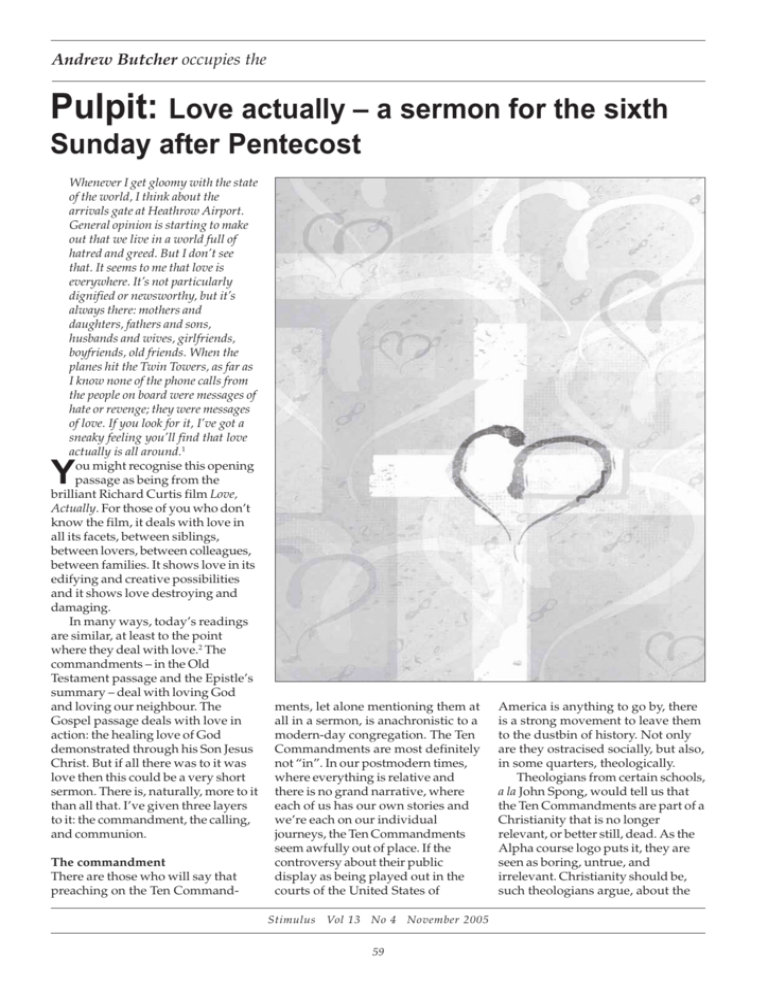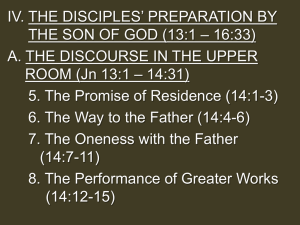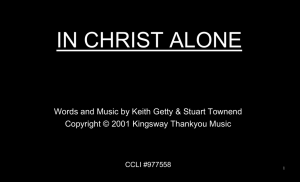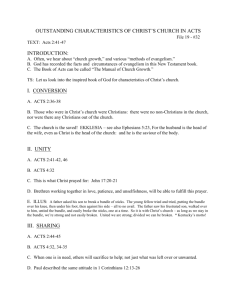Pulpit: Love actually
advertisement

Andrew Butcher occupies the Pulpit: Love actually – a sermon for the sixth Sunday after Pentecost Whenever I get gloomy with the state of the world, I think about the arrivals gate at Heathrow Airport. General opinion is starting to make out that we live in a world full of hatred and greed. But I don’t see that. It seems to me that love is everywhere. It’s not particularly dignified or newsworthy, but it’s always there: mothers and daughters, fathers and sons, husbands and wives, girlfriends, boyfriends, old friends. When the planes hit the Twin Towers, as far as I know none of the phone calls from the people on board were messages of hate or revenge; they were messages of love. If you look for it, I’ve got a sneaky feeling you’ll find that love actually is all around.1 ou might recognise this opening passage as being from the brilliant Richard Curtis film Love, Actually. For those of you who don’t know the film, it deals with love in all its facets, between siblings, between lovers, between colleagues, between families. It shows love in its edifying and creative possibilities and it shows love destroying and damaging. In many ways, today’s readings are similar, at least to the point where they deal with love.2 The commandments – in the Old Testament passage and the Epistle’s summary – deal with loving God and loving our neighbour. The Gospel passage deals with love in action: the healing love of God demonstrated through his Son Jesus Christ. But if all there was to it was love then this could be a very short sermon. There is, naturally, more to it than all that. I’ve given three layers to it: the commandment, the calling, and communion. Y The commandment There are those who will say that preaching on the Ten Command- ments, let alone mentioning them at all in a sermon, is anachronistic to a modern-day congregation. The Ten Commandments are most definitely not “in”. In our postmodern times, where everything is relative and there is no grand narrative, where each of us has our own stories and we’re each on our individual journeys, the Ten Commandments seem awfully out of place. If the controversy about their public display as being played out in the courts of the United States of Stimulus Vol 13 No 4 November 2005 59 America is anything to go by, there is a strong movement to leave them to the dustbin of history. Not only are they ostracised socially, but also, in some quarters, theologically. Theologians from certain schools, a la John Spong, would tell us that the Ten Commandments are part of a Christianity that is no longer relevant, or better still, dead. As the Alpha course logo puts it, they are seen as boring, untrue, and irrelevant. Christianity should be, such theologians argue, about the and transformation. Without Non-Theologian Encounters the Gospel grand concepts of love and justice returning to the cross, our conof Mark. Each time I encountered the and tolerance – universal attributes ceptions of love are comfortable and Christ in the Gospel of Mark I was for the entire world. No longer is pleasant. And so we return to the struck by his calling and the there a place to tell people how they Ten Commandments, which must compliance of those who answered should live. To this argument, themselves be read in the light of it. He walks along a beach and says perhaps the epistle is welcome. It the cross. It is not that they have “follow me” and the disciples leave could be read as “really, the Ten lost their relevancy – for, to quote their boats and follow him. Its Commandments aren’t that Paul, we are not to sin so that grace simplicity astonished me. I realised important – the important things may abound. Rather, it could be seen how much we complicate following are loving God and loving our that the Ten Commandments show Christ. So often we demand things neighbour”. It is possible, creatively forth the sacrificial love that we are of people before they follow Christ, certainly, to interpret that with a or we try and educate them, or called to live as Christians. Even the broad brush. “Love”, to these confuse them, or berate them, or summary of love in the Epistle theologians, as it is socially, and expresses this. It is not that we are present them a Christ that is to Richard Curtis in his film, is called to love God and to love our palatable and pleasant. But all something of an all-purpose rubric. neighbour as a passive response; nor Christ did was call: “follow me”. It covers, quite literally, a multitude are we called to love God and our That’s all there was and that’s all of sins. In the name of love, we resist neighbour for our benefit or only there is. correcting those around us; we when we feel edified and blessed. There has been something of a eschew judging; we accept We are called to love God and to love phenomenon lately in strands of everything, except perhaps those evangelical Christianity, toward our neighbour as our response to the who don’t agree with us. self-fulfilment and self“Love”, of course, is mentioned in God’s love demonstrated to us on the New Testament – as our readings cross. Let us remind ourselves again advancement. We embrace courses that call us to find purpose in our of 1 John 3:16: “we ought to lay today show. However, “love” here lives and to use is not the image, it’s that purpose, and not the focal point, all the aspects of it, it rather interprets as our driver in life, an image. What the “We are called to love God and to love our a bit like the New Testament neighbour as our response to the God’s love yellow-brick road means by love is of Dorothy, the Tin embodied in the demonstrated to us on cross.” cross. As 1 John 3:16 Man, et al. Of puts it: “We know course this love by this, that he emphasis on selfdown our lives for one another.” laid down his life for us – and we fulfilment is not unique to the church. We express it in our songs ought to lay down our lives for one and often in the language we use, The calling another.” However, there is more than just a The danger of removing love, in but browse the bookshelves, or even the Internet, and you will see commandment. While there are this context, from the cross, is that it that the search for self-fulfilment is those who will ignore the Ten becomes, on one hand, a meaninga particular trait of the society we Commandments in their totality; less abstraction and, on the other live in. hand, can be used to mean anything there are also those who think that’s In the course of writing this all there is. Here lies legalism. But, we want it to. As Hays puts it, sermon I was sent the June issue of more than that, in concentrating “[love] has become a cover for all the Daystar magazine. Two articles manner of vapid self-indulgence”3 solely on the Commandments, as if struck a chord for me; the first from or, to quote Stanley Hauerwas: “The they are a rigid prescription for life – New Zealander Murray Robertson; ethics of love is often but a cover for that, like medical prescriptions, we the second, from American Marva what is fundamentally an assertion take reluctantly albeit necessarily – Dawn. I quote from both; first of ethical relativism”. Love is used we forget our calling. Murray Robertson: as a sanction for everything and I spent much of last year reading Where once we engaged in anything; in the name of apparent through the Gospel of Mark. My first evangelism, the need now is for church unity and, more particularly, reading was through teaching it as marketing. If you listen to the way relevancy, love is employed as a tool, part of the Christianity Explored the gospel is now presented in our even, perhaps, a weapon, in the course. I then read it again as part of society it is very often in consumer battle for the minds and souls of my personal devotionals. I read it a terms. Jesus is presented as one the world around us. third time through Adrian Plass’ more commodity that is offered to However, contrast this love with excellent book on Mark’s Gospel, help us feel better about ourselves, the love of the Bible, which calls us which has the rather delightful title because consumerism is all about to repentance, disciplines, sacrifice, Never Mind the Reversing Ducks: A Stimulus Vol 13 No 4 November 2005 60 the culture of the self, and finding self fulfilment and self enhancement…. It’s time we told the truth. The gospel is not primarily about me and my well being. It’s about the Kingdom of God. Jesus came to start a revolution to bring transformation to the world. Not to set up shop as some kind of Californian psychologist helping people feel better about themselves.4 And, now, equally strongly, Marva Dawn: We try to attract people with our style of worship, a charismatic preacher or big-name band, but that’s taking the easy-way out – because it’s too hard to love our neighbour…. I’ve interviewed thousands of teenagers and not one of them said the music style had kept them away from church. They all said it was because nobody cared. How many people talk to teenagers at church on Sunday? How many churches espouse family values but don’t include single people in their church family? It’s no wonder our young people are so desperate.5 We’ve taken the call to follow Christ and turned it into a journey in an air-conditioned bus with well chosen music, comfortable seats, pleasant company, and on-demand refreshments, whilst alongside us are those walking on the road with little or nothing, in need of friendship, care, and love. For many Christians, loving God and loving our neighbour is something we prefer to do whilst remaining in the church pew. But there was more than the call to follow Christ, and the disciples came to discover this – as we should too. And the call was to take up our cross and follow Christ. That call has lost its power as well. How many of us could seriously do that? How many of us would be prepared, like Christ, to look toward Jerusalem and walk toward Golgotha? Christ’s call was a call to sacrifice. Can we say, with the Apostle Paul: “I want to know Christ and the power of his resurrection and the sharing of his suffering to become like him in his death if somehow I may attain the resurrection from the dead”6 ? If we are following Christ so that we can feel good about ourselves, then we are following for the wrong reasons. I remember sitting in prayer meetings where, at the end, people would ask “do you feel the Spirit” or “did God speak to you?” as if it was ouija-board praying, at the end of which we are meant to gain some sort of high. Prayer though can also be tortured and difficult and demanding. How often do we go away from a church service and say “I didn’t get anything from that”? as if somehow or other our needs were paramount, never mind whether we gave anything or, better still, “worship[ped] the Lord in the beauty of holiness”, as the hymn puts it? The communion Worshipping the Lord, I believe, calls for an active response, beyond singing songs or, indeed, preaching. As some of you will know I was quite ill last year. I spent time in hospital and had urgent surgery. During that same period of time, my grandmother died as did a friend of mine – a friend I’d made during my stay in hospital. It was an intensely difficult period in my life. The reactions of those around me were particularly interesting, although, at the time, some were hurtful. By and large people were very generous in their time and spirit; however, there were others who were less able to respond as I would have liked them to. I remember people saying to me, “but we prayed for you” as if somehow that was enough. Now don’t get me wrong. I believe strongly in the power of prayer. But, as my erudite friend John Dennison commented when I told him how people had responded: “if prayer is reaching out to God on behalf of others then surely we should respond by reaching out to other people on behalf of God.” And here we come to communion, with others and with God. It is a universal maxim that we should do unto others as we want done unto us. The difference, however, between that universal maxim, and the commandment as expressed in the Epistle we’ve read Stimulus Vol 13 No 4 November 2005 61 today, is that the commandment speaks of sacrificial service. I recall the words of the minor prophet Micah 7:8 – which, incidentally, were also the words of my school liturgy at Tawa College: “what does the Lord require of you? But to do justice, and to love kindness, and to walk humbly with your God.” Loving God, as with loving our neighbour, requires an action by us. And here we come to the Gospel passage. Through the three healings we see God’s love in action through his son Jesus Christ. To end it off, Christ proclaims that he was sent for this purpose: to tell the good news. Our communion with other people involves us rejoicing with those who rejoice and weeping with those who weep. It means us getting outside the air-conditioned bus and walking on the road with those who are lost and, as in the Gospel, in need of the healing touch of God. I’m reminded of a great story of a man called Joe, who fell down a hole. A priest walked past and saw Joe down the hole and gave the sign of the cross, said a prayer and walked on. A nurse walked past the hole and threw down some bandages and walked on. And then a friend came to the hole and climbed in. Joe said to his friend, “now that we are both in the hole, how are we to get out?” to which his friend replied, “I’ve been in the hole before and I know the way out”. Loving our neighbour – communing with them in the true sense of the term – calls us to climb down some holes and lend people a hand. It calls us to acknowledge where our weaknesses are, where the grace of God has worked in our lives, and to share that grace with others. It calls us to offer freedom to those trapped by all manner of things. It calls us to introduce them to the one who invites us to follow him. As is well-known, the Greek language has several words that refer to the aspects of the English word of love. C.S. Lewis, for one, wrote an entire book on the subject. The New Testament writers had four options before them: philia (friendship), storge (affection, especially within families), eros (love between the sexes or being in love), and agape (charity or selfgiving love). Yet, despite these choices, the New Testament writers are decidedly one-sided on their uses. Only philia and agape find their way into the New Testament: the former, philia, despite its common usage in Greek, is used sparingly, while the latter, agape, is strongly predominant. To the ancient Greek, agape spoke of a love beyond emotion, beyond an experience. It was, as William Barclay put it, “a principle by which we deliberately live”7 Yet all these aspects of love are present, in the cross, in the Trinitarian relationship, as they should be in Christian community. As Stanley Grenz reflects on it: In keeping with the divine character, the Spirit leads those who are in Christ into a mutuality or relationality characterized by an agape that encompasses a “sensing with” others as those whom God has created with the goal of participating in the new humanity…. the Spirit leads those who are in Christ to reflect through their communal life the kind of love that characterizes the triune God…. As this occurs, the church serves as a community of salvation. Thereby, it becomes a fellowship of those whose relationships are being transformed by the power of the indwelling Spirit to reflect as far as possible in the midst of the brokenness of the present the eschatological community modeled after the fullness of love present within the dynamic of the triune God.8 And then we return again to the cross. By participating in Communion, we are reminded again of that calling to take up our cross and to follow Christ. As he took up his cross, we will take up the bread and the water and, for a moment, remember – and perhaps relive in a way – the sacrificial event that took place. As the nails enter his hands, we may recall the hands the healed Peter’s mother-in-law and others; we may recall the hands that beckoned us. As Christ cries out “forgive them, for they know not what they do” we may recall his gentle voice calling to us; we may even apply his forgiveness to ourselves. As darkness covers the mid-afternoon sun, we may recall the darkness that we have known, in our times of abandonment and loss, walking on a road frequented by the wounded. As three days later, we, with Mary, see the rolled away stone and meet the resurrected Christ, we may ourselves feel the healing power which that represents, we may feel the burdens lifted, we may feel the joy of the resurrection. As shortly thereafter, Christ embraces Peter on the beach, we may recall the times we’ve been embraced by God, or by those who follow him, when we’ve let others, or ourselves, down. As God invites Peter to feed his sheep, we may recall again his call to follow him. As we see the Easter events in their totality, we may recall again the love that God has for us, that he sent his only Son to die on our behalf, so that we might know forgiveness of sins and have eternal life. When I survey the wondrous Cross, Stimulus Vol 13 No 4 November 2005 62 where the young prince of Glory died, my richest gain I count but loss, and pour contempt on all my pride. Forbid it Lord that I should boast, save in the Cross of Christ my Lord, All the vain things that charm me most, I sacrifice them to his blood. See from his head, his hands, his feet, sorrow and love flow mingling down, Did e’er such love or sorrow meet, Or thorns compose so rich a crown. Were the whole realm of nature mine, would be an offering far too small, love so amazing, so divine, demands my life, my soul, my all.9 Christ calls us to take up our Cross and follow him; he commands us to love our neighbour and to love our God. God sent his Son to die for us because he loves us that much. He raised him from the dead because he wants us to experience that love for eternity. For, you see, it is, all about love, actually. Endnotes 1. Exodus 20:1-17; Romans 13:8-10; Luke 4:31-43 2. Richard Curtis, Love, Actually – opening monologue, 2003. 3. Richard Hays, The Moral Vision of the New Testament: A Contemporary Introduction to New Testament Ethics (San Francisco, CA: HarperSanFrancisco, 1996), 202. 4. Murray Robertson, “It’s Time for the Revolution”, Daystar, 5 (2005):2. 5. Marva Dawn, “Money, Sex, Power and Worship’, Daystar, 5 (2005):7. 6. Phil 3:10. 7. Quoted in Stanley Grenz, The Social God and the Relational Self: A Trinitarian Theology of the Imago Dei (Louisville, KY: Westminster John Knox Press, 2001), 313. 8. Grenz, 335. 9. Issac Watts, When I Survey the Wonderous Cross Andrew Butcher has a PhD in sociology and is also studying theology part-time through Otago University. Andrew works as a sociologist in the civil service in Wellington.









